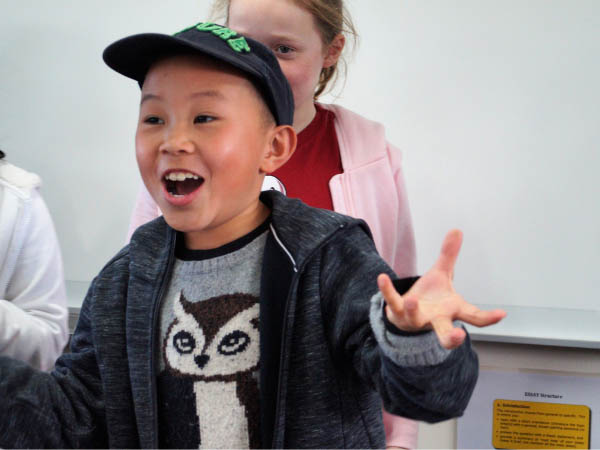
Not everyone is born confident.
Some people just have a knack for talking to other people. Extroverts become energised when taking part in a discussion – both in private conversation and onstage – and so are much more likely to enjoy the experience.
But presenting in front of audiences isn’t for everyone. Introverts like myself take their energy from being alone, and naturally fear the stage.
We are not born confident. But confidence in these situations can be learned – the team at Speaking Schools has compiled three ways we can help kids feel like a natural onstage.
Kids just want to have fun
The most common phrase you hear when a student doesn’t want to speak is ‘Don’t worry, it will be over soon’. This legitimises the narrative inside that child’s head – the one which says sharing my thoughts is scary.
Public speaking may be scary, but it doesn’t need to be. Providing students with a safe environment– one with no judgment, where everyone is encouraged to take part – helps with that fear, and allows them to channel their nerves. Whilst the adrenaline rush may never go away – having presented hundreds (if not thousands) of speeches, I can personally testify to that – once students realise the sky won’t fall in when they head to the front of the classroom, that rush can actually become a pretty enjoyable experience.
It’s important to change the narrative – don’t emphasise that it will be over soon, but instead will be fun if they just give it a chance in front of the right audience.

Children don’t learn on their own
The most common response I see from parents after they watch their child is some version of the phrase ‘Well done!’, which is great to see. Students thrive on positive feedback – the more they get, the more confident they become in their own abilities.
That said, I sadly sometimes also hear parents giving what we call negative feedback – criticisms of what the student has done, explanations as to how they’ve failed. This can deal massive blows to students’ confidence – particularly when they receive it from someone they trust, especially a parent.
Whilst no one is perfect, and you can’t just hand out positive feedback when students do something wrong, it is always important to pair negative comments with a constructive way that they could improve if they were to do it again. This constructive feedback should always follow something positive (so they feel like they did well, but just have something small to work on) and general in nature (so they can apply it in a different speech).

Practice, Practice, Practice
In psychology, exposure therapy involves exposing a patient to the source of their anxiety in a safe environment. Whilst not quite on the same level, this is the best way to help students build their resilience, and get over their fears of public speaking.
There are plenty of ways to do this at home – the important thing is that it doesn’t feel like homework. Use games to help them think on their feet and communicate their thoughts (there are plenty of great board games out there if you’re looking for inspiration). Encourage them to express their opinions over the dinner table, and ask them to justify them (in a supportive way, of course!). Don’t simplify your vocabulary, and help your child to expand theirs.
But there is also no substitute for a good audience. Encourage them to participate in competitions at school. Make sure they practice properly before compulsory school speeches. Or, if they’re not at this stage just yet, send them along to a workshop where they can be taught the necessary skills, and get the exposure therapy they need to develop their confidence.

Sydney Speaking School offers a range of holiday programs in both public speaking and debating for students aged 6 – 15 in Moore Park, North Sydney and Parramatta, as well as a number of term programs all over Sydney.
With the vision of developing the speaking skills across Australia’s largest city, Sydney Speaking School has developed a range of programs which seek to bring out the charismatic speaker that hides within every school student. Whether shy or outgoing, their coaches understand how to share the wealth of their many years’ of experience using fun, engaging and welcoming activities to improve the communication skills of primary and secondary school students.
School Holiday Programs
Ages 6 – 7 (Cats)
Presentation Skills – Tabby Cats
Presentation Skills – Tigers
Ages 7 – 9 (Marsupials)
Speaking Camp – Koalas
Speaking Camp – Kangaroos
Ages 9 – 12 (Birds)
Debating – Hummingbirds
Debating – Hawks
Public Speaking – Hummingbirds
Public Speaking – Hawks
Ages 12 – 15 (High School Programs)
Foundations of Debating
Experienced Debating
Foundations of Public Speaking
Experienced Public Speaking
Contact via email at sydney@speakingschools.com.au or call 0404 107 372.








